In the Vega del Guadalquivir, as it passes through Seville, Agrícola Ruiz Valero - a partner of SAT Citran - concentrates the largest production of pigmented oranges in all of Andalusia. “Agrícola Ruiz Valero and Citran are the leading producers of blood oranges throughout Andalusia. We produce nearly one million kilos of Sanguinelli, in addition to Navel Cara Cara, Kirkwood, and Ruby Valencia Late,” stated Juanfran Ruiz, the manager of the Ruiz Valero Group.
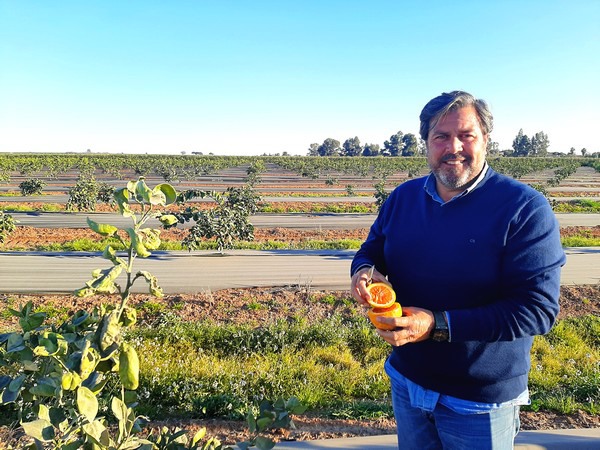
“We have spent many years searching for quality, color, flavor, and all the characteristics that the market requires of pigmented oranges. We have established a test field to study the different varieties and patterns and their behavior in the area with the aim of obtaining a wide catalog of pigmented varieties, either lycopene or anthocyanins, to cover the campaign in the northern hemisphere from December to June.”
“We have a collaboration agreement with the Junta de Andalucía through IFAPA, to analyze the development of 12 patterns, the most used in this area and 6 brought from the United States that are supposedly tolerant to HLB, in which we have grafted different varieties of pigmented oranges from Spain and Italy. In a few years, when the trees are bearing fruit, we'll be able to see all of Europe's pigmented oranges varieties in this test field.”
“The idea is to return to traditional agriculture but make use of the technology we have nowadays”
Agrícola Ruiz Valero, together with ARV Biodén, Agrorugil, and Freshruiz, form the Ruiz Valero Group. The Group produces 17 million kilos of citrus fruits a year, is one of the 13 largest producers in all of Spain, and is the leading provincial producer. “Agrícola Ruiz Valero is a family group that my parents started when they came from Alcolea to the Brenes area in 1940,” Juanfran stated. “Back then, they started leasing 5 plots of land. Now, Ruiz Valero has 870 hectares of crops, 630 of which correspond to citrus.”
“In the 80s, Antonio and Rafael Ruiz Valero invited several farmers from Brenes to join them and create Citran, which is currently made up of 9 families. We have a total of 1,300 hectares of our own production,” the manager of Citran stated. “Some 150 hectares are devoted to stone fruits and the other 1,150 to citrus fruits; of these, 100 hectares are dedicated to the cultivation of pigmented oranges, 80 to grapefruit, 110 to the production of organic citrus, and 30 to Demeter citrus fruits. 40 that are in the conversion process will soon be devoted to biodynamic agriculture,” he highlighted.
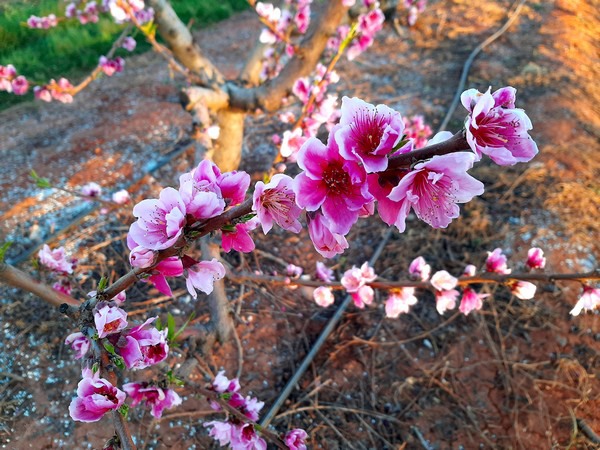
“We started to grow organic products seven years ago, and we saw that, after decades of using herbicides and pesticides, the soil came alive again once we stopped using these products. Since then we have worked to improve the sustainability of production, returning to traditional agriculture but making use of today's technology.”
“We collect manure from nearby farms to make our own compost, and we use the agroclimatic stations we have installed on farms to make fertilizer and irrigation decisions in real-time based on soil temperature and humidity data, electrical conductivity…”.
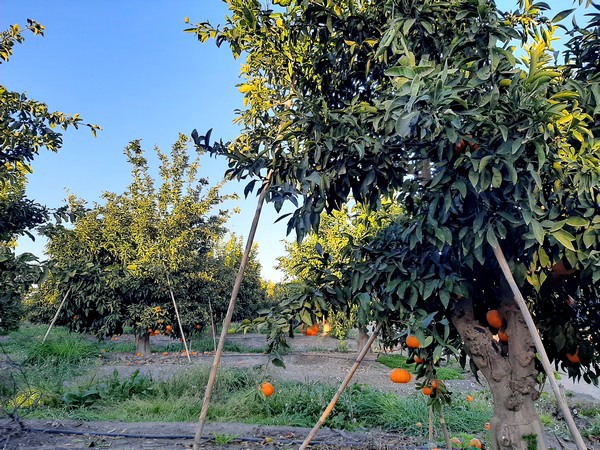
“In addition, for the past year we've been using drones to carry out localized treatments in a non-invasive way, thus reducing our carbon footprint, and to apply biodynamic preparations in our Demeter farms,” stated Juanfran. “Apart from improving our environmental impact, we also want to influence our social impact via an agreement we have with the Anabella Foundation, which has already allowed us to help one of our workers in a situation of abuse.”
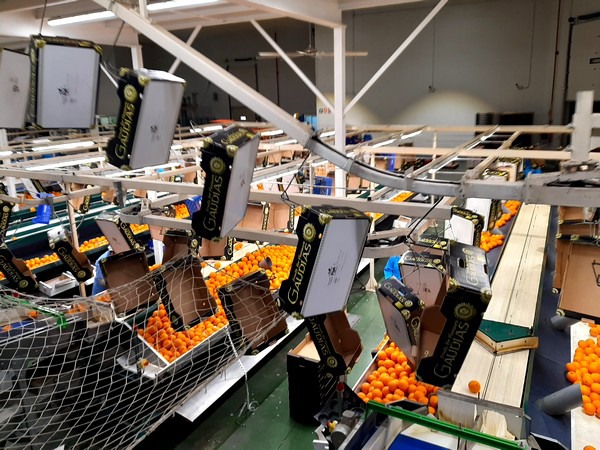
“The cost of our processed fruit is much higher than the €0.65/kg of Egyptian oranges”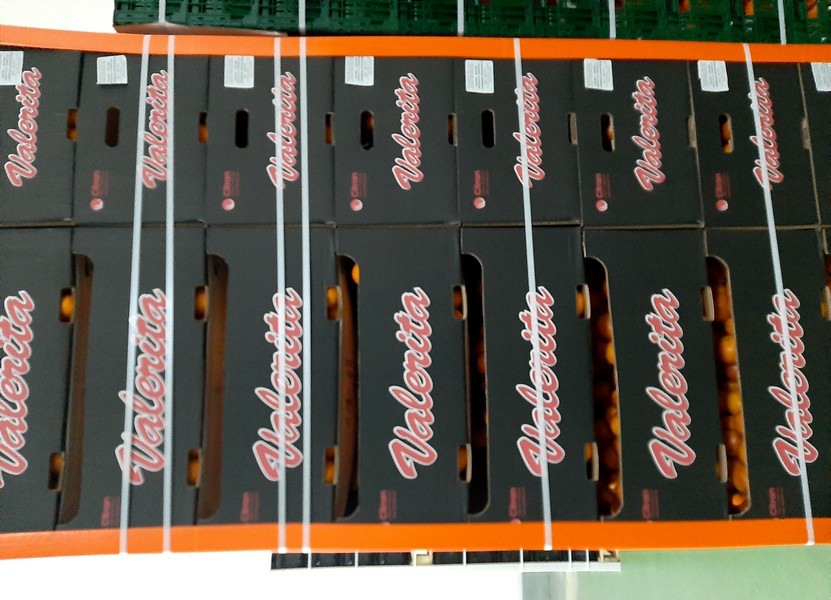 Citran's warehouse, in the area of Brenes, has 13,000 m² divided into two warehouses, one for conventional products and the other for handling organic fruit and Demeter. “When we have a full yield, we work an average of 300,000 kilos of fruit per day,” Juanfran added. “Last year we produced 40 million kilos in total, but this year there's going to be less citrus production. In the second part of the campaign, there will be 40% less fruit - and up to 60% less in some varieties– but despite the lack of oranges,
Citran's warehouse, in the area of Brenes, has 13,000 m² divided into two warehouses, one for conventional products and the other for handling organic fruit and Demeter. “When we have a full yield, we work an average of 300,000 kilos of fruit per day,” Juanfran added. “Last year we produced 40 million kilos in total, but this year there's going to be less citrus production. In the second part of the campaign, there will be 40% less fruit - and up to 60% less in some varieties– but despite the lack of oranges,
the market has stopped.”
“It seems that, since there is less orange in Spain this year, the chains have wanted to secure their campaign by buying from other origins. We are seeing Egyptian oranges being sold in Europe at 65 cents. We just can't compete against that.”
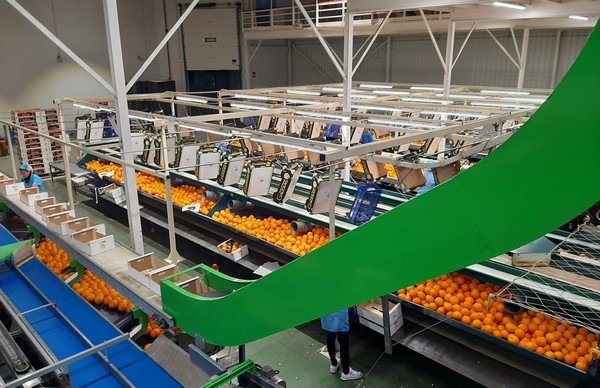
Not only have producers had to face weather conditions, such as the drought, which is responsible for the decrease in this year's campaign, and the frosts of recent days, but also rising costs, CAP cuts, or inequalities with imports, Juanfran stated. “This includes working conditions and the use of phytosanitary products. We live in a globalized market, but only at a commercial level; not at the level of production requirements. That's why we continue to work on distinguishing ourselves from our competitors in the only possible way, with new varieties that have more flavor and are produced in a sustainable manner.”
For more information:
Agrícola Ruiz Valero
Calle Real, 94
41310, Brenes, Sevilla (España)










